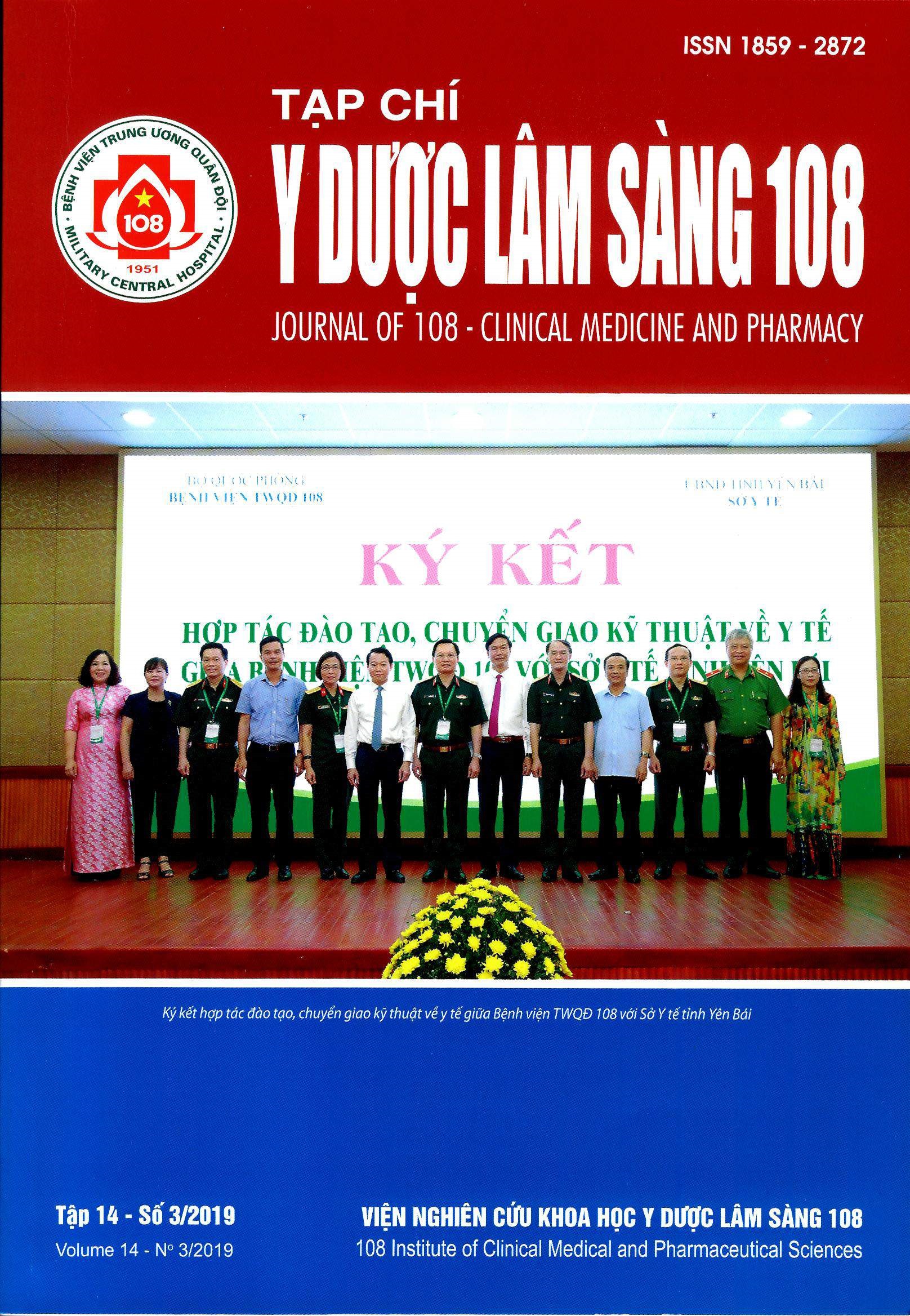Thiết lập xét nghiệm xác định đột biến gene PIK3CA ứng dụng theo dõi đáp ứng aspirin trong điều trị dự phòng ung thư đại trực tràng
Main Article Content
Keywords
Tóm tắt
Mục tiêu: Thiết lập phương pháp xác định đột biến gene PIK3CA để ứng dụng trong tiên lượng điều trị ung thư đại trực tràng bằng aspirin. Đối tượng và phương pháp: Các dòng tế bào mang các điểm đột biến khác nhau của PIK3CA như MCF-7, H460, HTC116 được nuôi cấy và pha loãng nồng độ trong các dòng tế bào bình thường theo tỷ lệ 50%, 25%, 5%, 1%, 0,1% và 0%. Sau đó, được tách DNA để đánh giá độ nhạy. PCR đặc hiệu allele có tích hợp công nghệ Amplification refractory mutation system (ARMS) được sử dụng để phát hiện đột biến (PCR-ARMS). Giải trình tự gene được sử dụng để xác định độ đặc hiệu của PCR-ARMS. 26 mẫu bệnh phẩm máu từ bệnh nhân ung thư đại trực tràng được sử dụng để thử nghiệm sàng lọc bước đầu. Kết quả: Xét nghiệm PCR-ARMS đã được xây dựng thành công cho phép xác định các trạng thái đột biến 1633G > A (exon 9) và 3140A > G (exon 20) của gene PIK3CA khi DNA đột biến chỉ chiếm 1% trong DNA bệnh phẩm. Kết quả giải trình tự khẳng định độ đặc hiệu của PCR-ARMS. Trong số 26 bệnh phẩm ung thư đại trực tràng, chúng tôi phát hiện được 3 bệnh phẩm mang đột biến gene PIK3CA. Kết luận: Xét nghiệm xác định đột biến gene PIK3CA với độ nhạy kỹ thuật 1% đã được xây dựng thành công.
Từ khoá: Ung thư đại trực tràng, PIK3CA, aspirin.
Article Details
Các tài liệu tham khảo
2. Schmoll HJ et al (2012) ESMO Consensus Guidelines for management of patients with colon and rectal cancer. A personalized approach to clinical decision making. Ann Oncol 23(10): 2479-2516.
3. Allegra CJ et al (2009) American Society of Clinical Oncology provisional clinical opinion: Testing for KRAS gene mutations in patients with metastatic colorectal carcinoma to predict response to anti-epidermal growth factor receptor monoclonal antibody therapy. J Clin Oncol 27(12): 2091-2096.
4. Normanno N et al (2009) Implications for KRAS status and EGFR-targeted therapies in metastatic CRC. Nat Rev Clin Oncol 6(9): 519-527.
5. De Roock W et al (2011) KRAS, BRAF, PIK3CA, and PTEN mutations: Implications for targeted therapies in metastatic colorectal cancer. Lancet Oncol 12(6): 594-603.
6. Karapetis CS et al (2008) K-ras mutations and benefit from cetuximab in advanced colorectal cancer. N Engl J Med 359(17): 1757-1765.
7. Amado RG et al (2008) Wild-type KRAS is required for panitumumab efficacy in patients with metastatic colorectal cancer. J Clin Oncol 26(10): 1626-1634.
8. Liao X et al (2012) Aspirin use, tumor PIK3CA mutation, and colorectal-cancer survival. N Engl J Med 367(17): 1596-1606.
9. Chan AT, Ogino S, Fuchs CS (2007) Aspirin and the risk of colorectal cancer in relation to the expression of COX-2. N Engl J Med 356(21): 2131-2142.
10. Algra AM and PM Rothwell (2012) Effects of regular aspirin on long-term cancer incidence and metastasis: A systematic comparison of evidence from observational studies versus randomised trials. Lancet Oncol 13(5): 518-527.
11. Rothwell PM et al (2010) Long-term effect of aspirin on colorectal cancer incidence and mortality: 20-year follow-up of five randomised trials. Lancet 376(9754): 1741-1750.
12. Rothwell PM et al (2012) Effect of daily aspirin on risk of cancer metastasis: A study of incident cancers during randomised controlled trials. Lancet, 2012. 379(9826): 1591-1601.
13. Martini M et al (2012) Targeted therapies: how personal should we go? Nat Rev Clin Oncol 9(2): 87-97.
14. Rothwell PM et al (2011) Effect of daily aspirin on long-term risk of death due to cancer: Analysis of individual patient data from randomised trials. Lancet 377(9759): 31-41.
15. Kalinsky K et al (2009) PIK3CA mutation associates with improved outcome in breast cancer. Clin Cancer Res 15(16): 5049-5059.
16. Janku F et al (2012) PI3K/AKT/mTOR inhibitors in patients with breast and gynecologic malignancies harboring PIK3CA mutations. J Clin Oncol 30(8): 777-782.
 ISSN: 1859 - 2872
ISSN: 1859 - 2872
